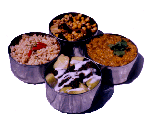X-Rated Home Cooking
If you have ever bought a cookbook, let's suppose a Chinese one, hoping
to duplicate your favorite restaurant dishes, then you have probably
been disappointed to find that the recipes don't match up to the Ma
Po Tofu or Hot and Sour Soup you dreamed of making nightly.
That is partly because the menus of "ethnic" restaurants
(as if Europeans and Euro-Americans have no ethnicity?) have been standardized
to American palates, and partly because restaurants have a repertoire
based on the Royal food tradition while most cookbooks keep it simple
for those of us who don't have our own wood-fired ovens and kitchen
staff. Restaurant equals royal food, cookbook equals peasant food.
The great cuisines of the world developed in countries with temperate
climates, good soil, contact with trade from different cultures, and
Royalty. Before there were restaurants -- really a nineteenth century
invention -- the only people who solely prepared elaborate food for
others worked for the very rich. Before industrialization, the very
rich were mostly royals.
French food is a familiar example, who else but someone with a lot
of time on their hands and a mandate from Louis or Charles to create
ever-more-elaborate dishes would have thought to force-feed a goose
until it was so bloated that flight was a mere memory, then cut out
its overstuffed liver and grind it up with spices and herbs and call
it "goose liver dip"? Julia Child says, "...pate is a
dressed-up meat loaf - why not give it a try," - but some chef
in a castle kitchen had the time and decadence to come up with pate
de foie gras in the first place.
You can bet that Thai kings and princes who were believed to possess
the virtue of all their people and often in history to be incarnations
of Shiva and other Buddhist divinity, ate really well. Go to any Thai
restaurant today and you'll see Pad Thai, the ubiquitous national noodle
dish, imported and reworked from Chinese noodle-based cuisines to the
north. You'll get fragrant, delicate, and extremely hot curries from
India to the west, and from Malaysia to the south you can try out the
heavy, dense, peanutty Mussamun curry, literally "Muslim-style."
Dazzled, perhaps, by multilayered, many-hued towers of food, by mousses
and foams and aspics and little forks for the escargot, by warm lemon-scented
towelettes and glamorous menus and desserts named "Death by Chocolate,"
and radishes cut to look like roses, I grew up believing,in spite of
information from my palate and heart to the contrary,that restaurant
food was superior to its home-cooked cousin with the obvious ingredients,
stultifying regularity, and trail of dirty dishes.
But my bedside reading this week has been a cookbook (yes, I read cookbooks,just
as the billionaires of today were called nerds fifteen years ago for
reading Byte magazine, I too will have my revenge) that is changing
my mind.
Unplugged Kitchen by Viana la Place is a reflection on simple food
bordering on erotic idolatry. This woman gets off on rubbing a young,
tender, moist clove of garlic over the rough surface of grilled bread,
and I held my breath and had a fitful night's sleep after reading her
instructions for eating Dried Fava Beans with Oregano:
"To savor this dish to its fullest, you must eat the fava beans
one by one, squeezing out the soft cream inside into your mouth, then
sucking the skins until they are completely empty. The final picture
is dark, chalk-brown fava skins, emptied of flesh, lying in small heaps
in bowls that have been wiped clean with honest bread."
I never realized that good home-cooked food might need a rating.
Stefan Lynch Food Chain Chef/Cyclist
(read full chainletter)
More
Chainletters
